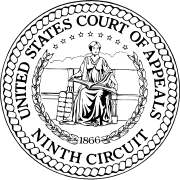Microsoft v. Motorola
| Microsoft Corp. v. Motorola, Inc. | |
|---|---|
 |
|
| Court | United States Court of Appeals for the Ninth Circuit |
| Full case name | Microsoft Corp. v. Motorola, Inc., Motorola Mobility, Inc., and Gen. Instrument Corp. |
| Argued | September 11 2012 |
| Decided | September 28 2012 |
| Citation(s) | 696 F.3d 872; 104 U.S.P.Q.2d 2000;12 Cal. Daily Op. Serv. 11, 223; 2012 Daily Journal D.A.R. 13, 619 |
| Case history | |
| Prior action(s) | 2:10-cv-01823-JLR, 871 F. Supp. 2d 1089 (W.D. Wash. 2012) |
| Holding | |
| Temporary anti-suit injunction upheld on interlocutory appeal | |
| Court membership | |
| Judge(s) sitting | Marsha S. Berzon, John Clifford Wallace, Sidney R. Thomas |
| Case opinions | |
| Majority | Berzon |
Microsoft Corp. v. Motorola Inc., 696 F.3d 872 (9th Cir. 2012) was a United States Court of Appeals for the Ninth Circuit case about Reasonable and Non-Discriminatory (RAND) Licensing and foreign anti-suit injunction.
The case was originally filed by Microsoft against Motorola in the Western District Court of Washington at November 9, 2010, claiming that Motorola had violated its reasonable and non-discriminatory licensing agreement to which Microsoft was a third-party beneficiary. The district court ruled that a company's agreement with a standards organization to provide Reasonable and non-discriminatory (RAND) terms of licensing to all other parties constitutes a contract that is enforceable by third parties.
While the U.S. domestic contract litigation had been proceeding, Motorola sued Microsoft in Germany for patent infringement in July 2011. The German district court granted to Motorola an injunction prohibiting Microsoft from selling allegedly infringing products in Germany based on German patent law. Then, Microsoft sought an anti-suit injunction against an injunction of patent infringement in Germany.
The district court granted to Microsoft an anti-suit injunction that prevented Motorola from enforcing a foreign patent infringement injunction that Motorola had obtained against Microsoft in Germany. After granting to Microsoft this preliminary injunction, the case was brought to the Appellate court in an interlocutory appeal by Motorola. The Ninth Circuit Court of Appeals reviewed the district court's foreign anti-suit injunction for abuse of discretion, and affirmed the District Court's decision.
Motorola was the holder of patents that were deemed essential to the 802.11 and H.264 industry standards, meaning that it would be necessary to use the ideas embodied in these patents if one were to create a device that would meet these standards. Many standards setting organizations, in an effort to reduce the possibility of patent holdup and increase competition, asked that the holders of any standards-essential patents agree to license these patents on a fair, non-restrictive basis. Motorola had indicated its willingness to license these patents on RAND terms on a worldwide, non-discriminatory basis in letters to both the Institute of Electrical and Electronic Engineers (IEEE) and International Telecommunications Union (ITU). Microsoft had several products that utilized these standards, most notably the Xbox 360 and personal computers running Microsoft Windows.
...
Wikipedia
